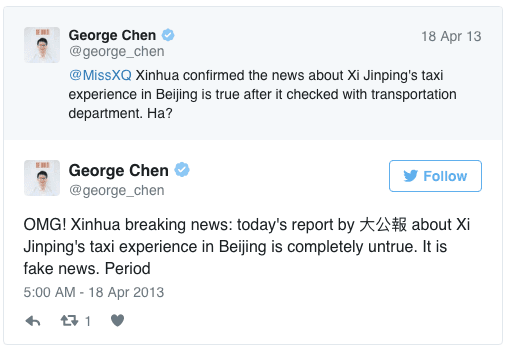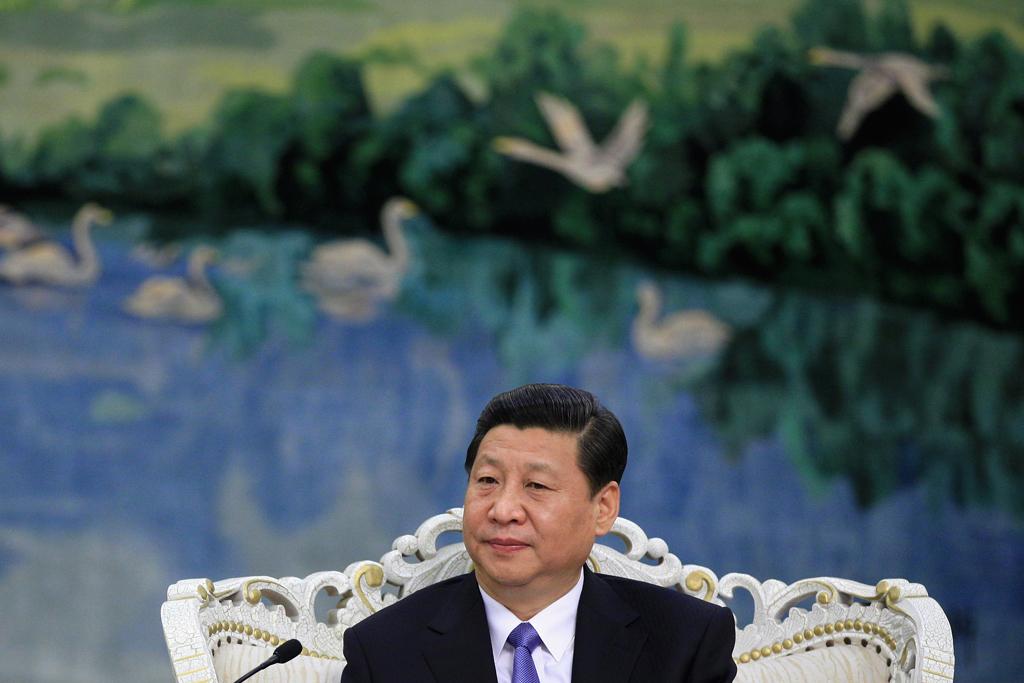What’s ‘fake news’ got to do with China?
Chinese President Xi Jinping at the Great Hall of the People on March 19, 2013, in Beijing, China.
HONG KONG — Chinese media today was consumed with a strangely out-of-the-blue report of a Beijing taxi driver who claims he drove the General Secretary of the Communist Party Xi Jinping in his cab several weeks ago.
Guo Lixin, the cabbie, today became the subject of glowing state-run media reports, which included a series of photographs showing his home, the receipts from the alleged taxi ride, and a framed, magnified copy of a note supposedly written by Xi Jinping wishing the driver, "Smooth and safe sailing!"
The ride is said to have taken place on March 1, two weeks before Xi took office as China's president, a largely ceremonial role. As Guo tells it, he recognized Xi after several minutes of talking about the horrendous pollution in Beijing, during which Xi supposedly said that he intended to "treat and rectify the damage," according to the Communist Party mouthpiece People's Daily.
Xi then admitted who he was, telling Guo that China's pollution should be considered in light of the pollution created by Western countries that industrialized some 100-150 years ago. When he exited the taxi, according to the account, Xi tipped the driver 50 cents — a trivial amount, but one that garnered appreciation, as tipping is not customary in China.
Sure sounds like Xi is a "man of the people," doesn't it? Initially the story seemed like a plant to bolster Xi's reputation during a time of heightened class tensions in China.
And a successful plant at that. The initial report, which appeared in a Beijing-controlled Hong Kong newspaper edited by a former staffer of the People's Daily, was quickly followed by a blitz of coverage by mainland media and social media.
More from GlobalPost: China reacts to student's death at Boston Marathon
But many China-watchers were skeptical, especially given the sensitivity around any news related to China's new No. 1.
"I thought the taxi story sounded a little too cute to be true — too close to tales of Qianlong Emperor traveling in disguise," said Beijing-based translator Brendan O'Kane.
And it seems their skepticism may have been well-founded. Xinhua, China's state-run news agency, reported not long after the initial reports that the Xi Jinping taxi-riding story was false!
They call it "fake news."
Even with all the suspicions about the original tale, this is a strange, unprecedented twist. You seldom, if ever, see this kind of correction issued about a story concerning a major leader, let alone a puff piece that all state-run media were allowed to run riot with for the last eight hours.
George Chen of the South China Morning Post puts it well:

What's especially puzzling is that the story was earning Xi popularity points on Chinese social media, where people were applauding his down-to-earth transportation choice. (Compared to a private limousine, that is.)
In his first several months at China's helm, Xi has striven to increase public trust in the Party by kicking off an anti-corruption campaign targeting the lavish spending by government officials on banquets, red-carpet events, and ribbon-cutting ceremonies.
One theory put forward by Luo Changping of independent Chinese magazine Caijing is that Xinhua's denunciation of the story will be used as a justification for further tightening control of the media.
We want to hear your feedback so we can keep improving our website, theworld.org. Please fill out this quick survey and let us know your thoughts (your answers will be anonymous). Thanks for your time!
